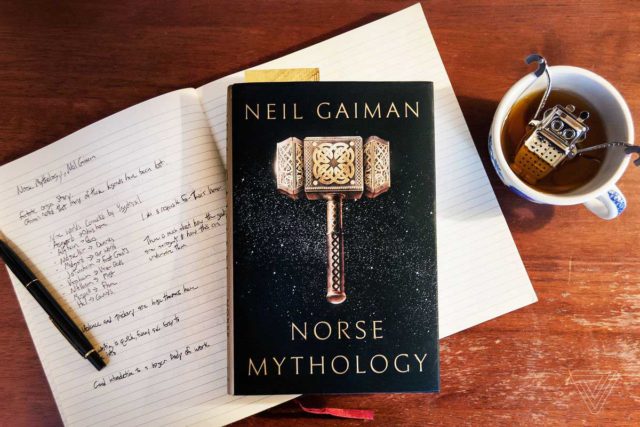Neil Gaiman’s Norse Mythology, which was published this February, is a retelling of the primaeval Nordic tales arranged in a novelistic arc.
I am not a Gaiman nut per se, but from the few of his books that I have read, it’s safe to say that his fictional realms are, more often than not, inspired by ancient mythology. In this book, he goes back to the original tales, beginning with the creation of the nine worlds, exploring the adventures within them, and finally, prophesying Ragnarok – the inevitable end of the world and the beginning of a new one.
The book is true to the myths, and for the most part covers the exploits of three major deities – Odin, the wise All-father; Thor, the strong god of thunder; and Loki, the charming trickster.
While there was a lot in this book that I was already aware of – the story of how Odin gained his wisdom, for example – there were also many incidents which were new to me. Loki tying up his balls to the beard of a goat for the entertainment of Asgardians was my favourite one.
Woohs:
Gaiman possesses the rare talent of writing fiction which is not only popular but also worthy of literary criticism.
By retelling the ancient myths in Norse Mythology, he makes them more approachable and engaging for a modern readership.
Perhaps the best feature of this book is that it’s honest – exactly as it claims on the cover, it is a collection of Norse stories about some familiar faces.
The thing about the original Norse myths is that very few records remain, resulting in a bunch of disjointed tales thrown together – a battle here, a quest there. Gaiman fixes this in Norse Mythology. Before delving into the adventures, he clearly establishes the confounds of this mythical world. He begins by giving the reader a guided tour of Yggdrasil and the nine worlds that emerge from it. The collection of parables that follows gradually leads up to Ragnarok.
Mehs:
To an extent, Norse Mythology is more of a re-wording than a retelling of the original tales. There is no major use of creative license, no spicing up of the old myths, and no putting forth of the author’s personal views about them.
You will love this if you are a fan of Gaiman’s brilliant writing style, but you might find that you’re not as interested in the stories he chooses to retell.
Throughout the book, one gets glimpses of characters one would like to hear more about – Kvasir, Fenrir, Hel, and basically everyone apart from Odin, Thor and Loki. But Gaiman does not delve deeper into their stories. From what he says in the author’s note, this shortcoming is due to the lack of substantial source material.
Verdict:
While this book accomplishes what it intended to, there is a good chance that a reader would expect more from this book than it offers.
Norse Mythology should be treated as a gateway novel for novices into the vast realm of mythological works. It is not for those who are already well-aware of the crucial Nordic myths.
Most readers will find that they can appreciate this book when they first read it, but it is not something they would wish to revisit.
I give this book 3 out of 5 stars.
Image Source: The Verge
Would you like to share your opinion and discuss more on the matter? Then add us on Snapchat and we could hit up an interesting conversation. Click the link below to add Economy Decoded on Snapchat.
ED – The Youth Blog on Snapchat
If you liked this, you might also be interested in:
http://edtimes.in/2017/03/massive-similarities-between-different-world-mythologies/



































